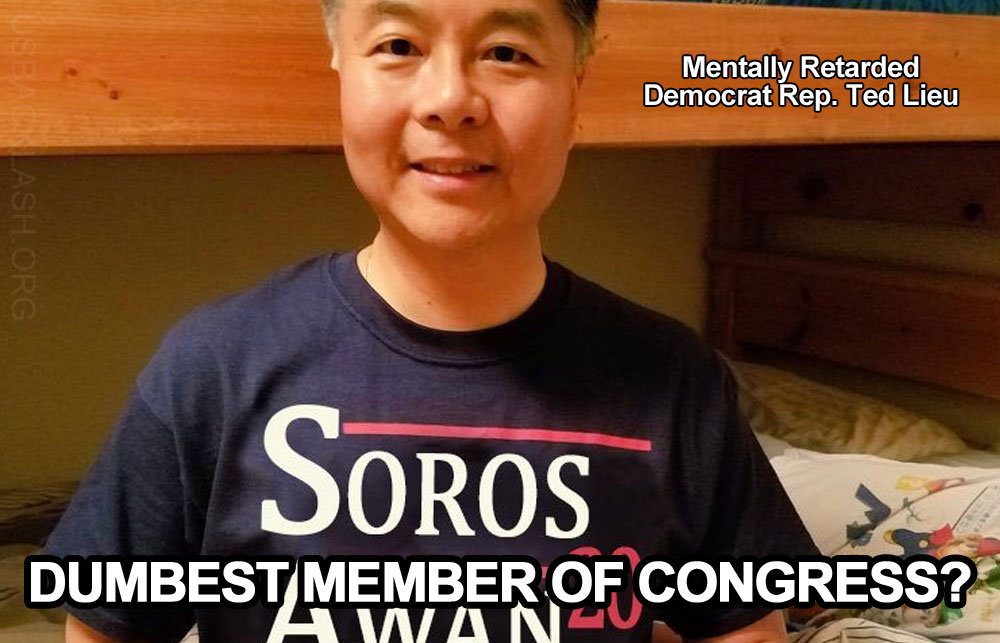Democrat Rep. Ted Lieu is dumb as a box of rocks, and he is corrupt as hell as well. We’re learning how little Ted Lieu paid Stanford large sums of money, in what appears to be a pat-to-play scheme to get his son admitted to one of the top California schools. We might as well start calling Ted Lieu “Lori Loughlin”, because their pat-to-play crimes seem to be very similar.

Mentally Retarded Democrat Midget Rep Ted Lieu Learned About Alabama Tornado Destruction From Tweets
Federal Election Commission (FEC) filings show that Little Ted Lieu gave at least $51,046 to Stanford over a period of about 2 years, and ahead of his son applying to Stanford.
After the recent admissions scandal at top California schools (including Stanford), the gifts of Rep. Ted Lieu (D., Cal.) would immediately raise concerns over the same type of academic pay-to-play pattern. However, the $51,046 to his alma mater, Stanford University, was not his own money but his campaign funds. It is like the Lori Loughlin but using someone else’s money. According to reports, the money was transferred just before his son was admitted to the highly competitive university. What is most shocking is that taking money for a campaign and then giving it to a school is not itself illegal. However, Lieu could still face some serious questions even under a law designed by Congress to allow what most donors would view as a bait-and-switch.
Lieu is the assistant Whip for the House Democrats and is an American success story. Born in Taiwan, Lieu became a citizens, attended Stanford, and then was an outstanding student at Georgetown Law Journal. He then held state and federal office. He is one of the most effective members on television.
The political contributions are subject to rules written by the people who collect them. Not surprisingly, the rules are written to allow members to raise money ostensibly for their own campaigns and then transfer the funds to others. They also are used for expenses that seem overtly personal and excessive. Take Eric Swalwell who recently was found to be spending his campaign funds on booze, limos, and rooms at the Ritz-Carlton (where his wife worked). Other members like former Rep. Aaron Schock (R., III.) were accused of using public funds (from his official office account) for excessive decorations of his office. The Schock story however received far more media coverage and he was later the subject of a prosecution. Those criminal charges were later dropped.
That brings us to the current scandal. Federal Election Commission (FEC) filings show that Lieu gave $51,046 to Stanford between February 2016 and June 2018. As the other admissions scandal was raging, Lieu was transferring political donations to the school that his son would be applying to for college.
Most citizens would find the donations outrageous and wrong. However, Lieu can claim that they are lawful and many voters are so tied up in this fierce partisan period that they will not call Lieu to account since he is a Democratic leader in Congress. Yet, some may ask why a university with a $29 billion endowment and one of the most affluent alumni bases in the world should receive tens of thousands of their donations as opposed to campaigns to protect the House majority or social justice programs.
Under the FEC rules, it may first appear that this is clearly a violation:
Using campaign funds for personal use is prohibited.
Commission regulations provide a test, called the “irrespective test,” to differentiate legitimate campaign and officeholder expenses from personal expenses. Under the “irrespective test,” personal use is any use of funds in a campaign account of a candidate (or former candidate) to fulfill a commitment, obligation or expense of any person that would exist irrespective of the candidate’s campaign or responsibilities as a federal officeholder.
More simply, if the expense would exist even in the absence of the candidacy or even if the officeholder were not in office, then the personal use ban applies.
Conversely, any expense that results from campaign or officeholder activity falls outside the personal use ban.
Stand Up To Government Corruption and Hypocrisy – usbacklash.org
